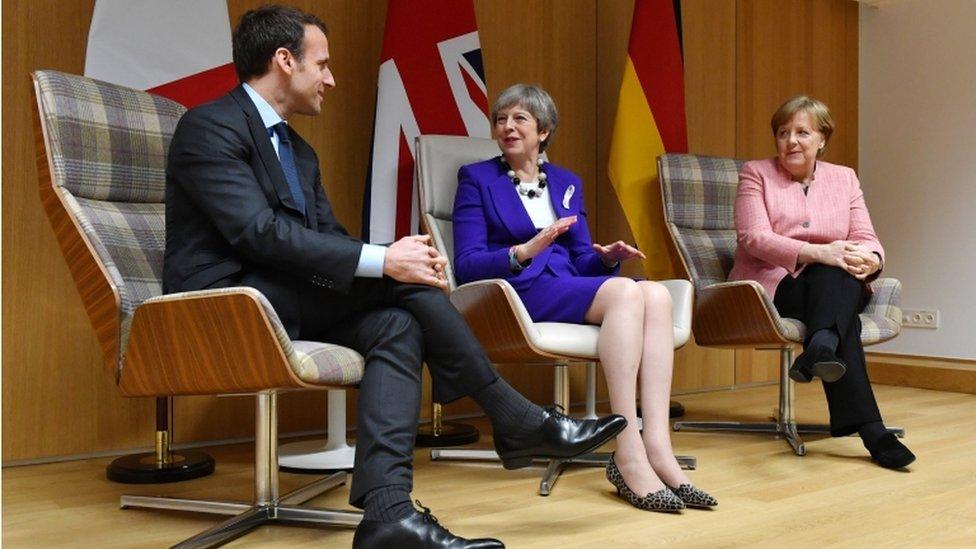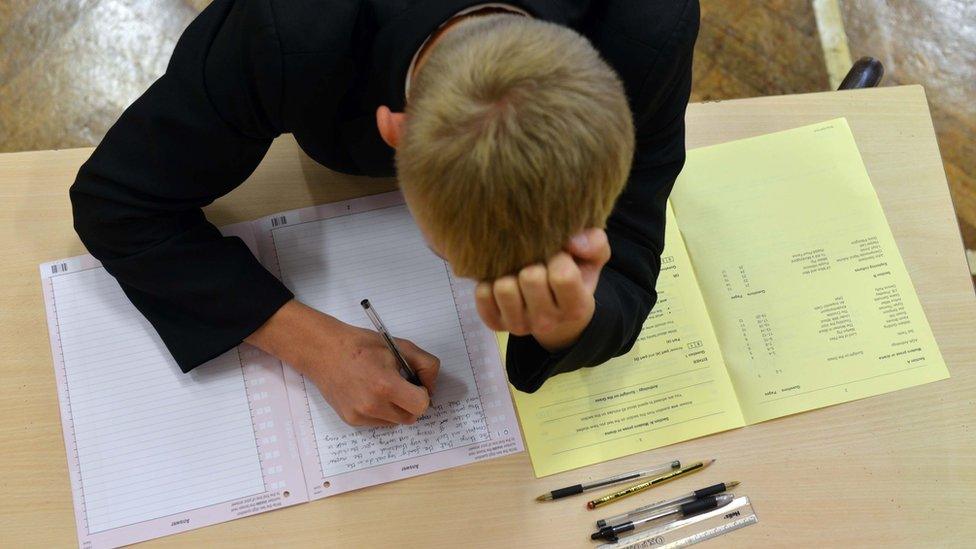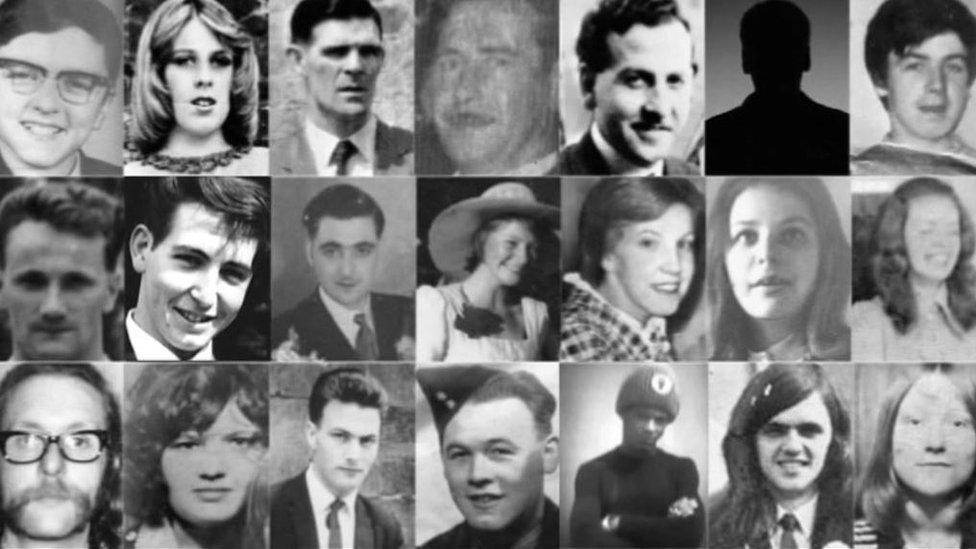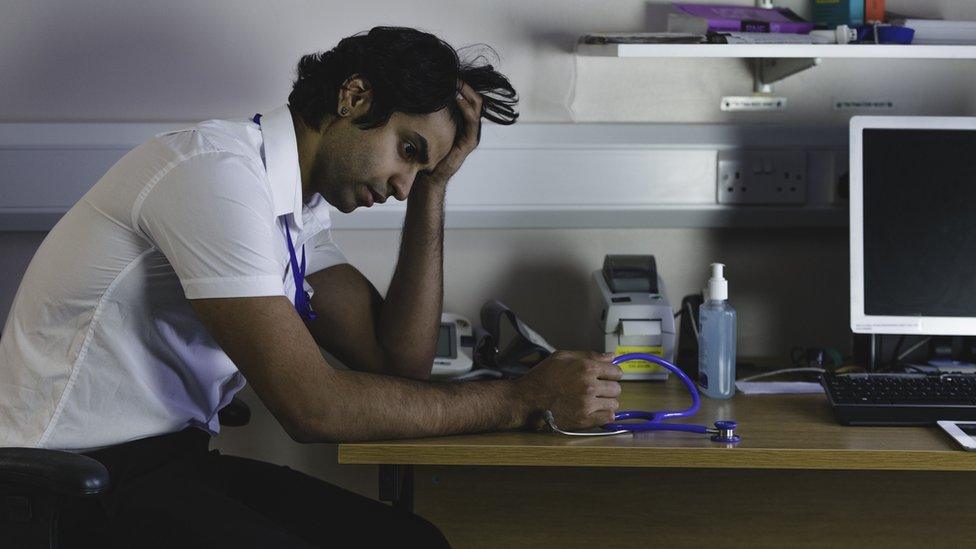Week ahead in Parliament
- Published

Theresa May is reporting back to Parliament on her meetings with EU leaders
Tum te tum te tum....(drums fingers on desk)....tuneless whistle...(finishes Suduko).... It's another low key agenda for next week in Parliament. There is still no sign of the many Brexit bills languishing in legislative limbo, while the whips try and construct a majority to push them through. Instead, the Commons has another general debate - the third in a fortnight - an opposition day and the traditional "anything goes" debate on the Easter adjournment, in which MPs can speak on any subject that takes their fancy.
In fairness, a lot of work seems to be going into ministerial speeches for these debates. One imagines teams of special advisers sweating over laborious pop-culture references for deployment in the bosses' soundbites (Liz Truss channelling Amy Winehouse to remark that the economy was "Back to Black" is the runaway winner in this category at the moment). But MPs seldom have to pass through the division lobbies, and the sense that controversial business is being held back, to the point where the legislative backlog is becoming uncomfortable, is unavoidable. And to make things yet more difficult for its business managers, even bills which the government might have expected to be fairly humdrum and uncontroversial have, perversely, found themselves in the spotlight, thanks to events, dear boy, events.
So the Sanctions and Anti-Money Laundering Bill has been given extra oomph by the Salisbury incident, with MPs now clamouring for "Magnitsky" clauses to target human rights abusers with personal financial sanctions. And a high-powered alliance of the former Tory Chief Whip Andrew Mitchell and the former Public Accounts Committee chair Margaret Hodge are pushing for a register of the ownership of companies in tax havens which are UK crown dependencies. But there's no sign of that bill re-appearing in the Commons for its report stage debates.
Then there's the Data Protection Bill, where the Cambridge Analytica saga has turned up the heat. Ministers now face calls for extra powers for the Information Commissioner, and new rights for social media users and consumers, and they might not have the votes to resist. Again, this won't be debated in the near future.
Meanwhile the real meat of the week will come in statements or urgent questions, which are often not decided on until the morning of the day in question, and in committee hearings on a series of sensitive issues. Top of the list will be the Prime Minister's report back on Monday, on the latest European summit, where the Brexit transitional deal and Britain's appeal for solidarity against Russia will both be discussed. And both subjects will undoubtedly pop up again, when the PM appears before the Commons Liaison Committee on Tuesday.
In the Lords, peers reach the end of their epic committee stage consideration of the European Union (Withdrawal) Bill but that is just the appetiser for the much more intense report stage debates which will follow after Easter - when actual votes will take place and actual amendments will probably be made.
Here's my rundown of the week ahead:
Monday 26 March
MPs begin their week (2.30pm) with work and pensions questions, followed by a statement from Theresa May on the latest EU Council meeting.
They will get an extended opportunity to discuss her comments on one of the key summit issues, in the general debate on Russia which will follow. Doubtless, all kinds of defence, security and money-laundering issues will be raised.

MPs will debate a petition on allowing pupils to take books into English GCSE exams
In Westminster Hall (from 4.30pm) MPs will debate e-petition 200299 on the "closed book" GCSE English literature exams. The petition says: "Last year, lots of students struggled with GCSE English Literature as it was a closed book exam. Because of this many failed. How can they expect us to remember quotes from 15 poems, plus how to analyse them, plus remembering the whole plot, themes, characters and quotes from another book."
The petition was signed by 165,934 people but the government has responded by saying: "Exam boards do not allow access to copies of whole texts in exams, but provide relevant extracts as exam materials. Pupils should be able to understand and analyse the texts, not memorise them."
In the Lords (2.30pm) question time ranges across the impact on children of the two-child limit policy of some benefits to the decision to offer HPV vaccinations to gay men.
After that peers return to their committee stage debates on the European Union (Withdrawal) Bill. This is Day 10 and the sections of the bill which will be discussed cover "Interpretation, Index of defined expressions, Financial and other matters and General and final provisions." Or, to put it another way, the miscellaneous bits at the end of the Bill.
Tuesday 27th March
The Commons begins (11.30am) with Foreign Office questions which, again, may well be followed by a clutch of urgent questions and statements.
In the day's Ten Minute Rule Bill, the new Conservative MP Simon Clarke wants to make it a criminal offence for a person to discard used drugs needles in public places in a way that puts the public at risk. At the moment discarding used needles currently falls under littering laws, but Mr Clarke argues that it should become a prosecutable offence because of the risk it poses. His bill follows an incident in which a four year old constituent stumbled across a bag of used needles in a public play park in Loftus, East Cleveland.
Then, MPs polish off the report and third reading stages of the Financial Guidance and Claims Bill. This is not wildly controversial but Work and Pensions Secretary Esther McVey is adding new clauses banning unsolicited direct marketing related to pensions and to other financial products and services and the chair of her departmental select committee, Labour's Frank Field and the Lib Dem Stephen Lloyd are both offering amendments to toughen them up.
Labour's Stella Creasy, who has long campaigned on consumer financial issues, has a new clause to require the new financial regulator to consider the effect of high-cost lending using credit cards on consumer protection and produce an annual assessment of any consumer detriment. She has also signed an amendment from her colleague Gareth Thomas to require the new financial guidance body to provide information about credit unions. And there are front bench Labour amendments on mid-life financial reviews and on regulating claims management services.
In Westminster Hall Labour's Tanmanjeet Singh Dhesi will raise the impact of court closures (9.30-11am) in terms of delays in cases coming to trial and inconvenience for victims and witnesses. And he is also expected to call for the government to publish the Courts Bill promised in the Queen's Speech.
Labour MP Tonia Antoniazzi leads a debate on lymphoedema services (11.00-11.30am). Lymphoedema is a chronic swelling to parts of the body due to lymphatic failure. It can be the side-effect of surgery or radiotherapy but it may also be genetic, or a result of infection of injury.
One to watch in Westminster Hall is the Conservative Neil O'Brien - a former Downing Street policy wonk - on digital taxation (2.30-4pm). His debate will explore worries that the tax system is skewed in favour of online businesses, which are often difficult to tax effectively, at the expense of more traditional businesses, which face business rates and tend not to have elaborate tax arrangements which bounce their revenue through several countries. He wants to explore the work the Treasury is doing to capture the missing revenue from fast-expanding online businesses. Ministers want to see if an international agreement can be reached, but they are conscious that if that is not possible, the UK may have to act unilaterally. Mel Stride, the Financial Secretary to the Treasury, looks likely to be the minister responding.
The response of emergency services to calls from newly-built estates is the subject for Labour MP Jenny Chapman (4-4.30 pm). She is following up on a constituency case where an ambulance was unable to find the new house where one of the residents had suffered a heart attack, because the development did not yet feature on its navigation system. The man died. She will argue that updates should be supplied to the emergency services as soon as new houses are occupied, noting that the Royal Mail does seem to get immediate updates.

Twenty-one people were killed in the Birmingham pub bombings in 1974
Finally, Birmingham MP Richard Burden has a debate (4.30-5.30pm) on legal aid for families of the victims of the Birmingham pub bombings. The bombings of two pubs in 1974 killed 21 people and injured 182. The victims' families have fought for years to have the inquests reopened, and were awarded legal aid but the coroner Sir Peter Thornton QC ruled out naming alleged suspects, The families contested that ruling at the High Court and won. The coroner has responded by taking the case to the Court of Appeal. Mr Burden notes that his appeal will be backed by public money while the families have been told they will have to pay for their own lawyers. Mr Burden will be asking why the families are being denied legal aid, and for ministers to directly authorise public funding for them.
My committee pick is the latest hearing in the Digital, Culture, Media and Sport inquiry into fake news (10.30am) where the star witness is the Cambridge Analytica whistle-blower Christopher Wylie. They also have witnesses from Ofcom, IMPRESS, and the Independent Press Standards Organisation. And keep an eye on their efforts to summon a Facebook grandee, ideally Mark Zuckerberg, and fallout from their evidence session with Cambridge Analystica's Alexander Nix who has now been recalled to give further evidence to the committee.
At 4.30pm, the Prime Minister Theresa May is before the Liaison Committee to answer questions on four broad sets of issues: UK foreign policy, particularly relations with Russia; the plight of the Rohingya in Bangladesh/Myanmar; Brexit-related issues focussed on borders, food, farming and fishing; and the funding of the NHS, social care and public health. The session will be chaired by the Conservative Dr Sarah Wollaston.
In the Lords (2.30pm) question time ranges across the right of return of Palestinian refugees, Brexit negotiations and increasing the supply of council housing stock.
Peers will then perform their last rites on the Nuclear Safeguards Bill - with what will probably be a perfunctory third reading - before dealing with the raft of Northern Ireland legislation which had been rushed through the Commons in the previous week, including bills on the budget and on assembly members' pay. All the bills will be debated together and all stages of debate completed in a single legislative gulp.
Wednesday 28th March
The Commons day begins (11.30am) with questions to the Chancellor of the Duchy of Lancaster and Minister for the Cabinet Office, followed at noon by Prime Minister's Questions.

Gay sex remains illegal in Northern Ireland
In the day's Ten Minute Rule Bill the Northern Ireland-born Labour MP Conor McGinn wants the UK government to take powers to allow it to legalise gay marriages there. Normally, this would be a matter for the Northern Ireland Assembly, but with the Assembly and devolved government suspended he argues that gay people should not have to wait on a political settlement. An attempt to get same sex marriage through the Assembly, before it collapsed, was blocked by DUP AMs, using a mechanism called a Petition of Concern. Mr McGinn hopes that if the Commons approves his motion to bring in a bill, the government will take it as a signal that it should now act to bring the law in Northern Ireland into line with that of the rest of the UK and indeed the Republic.
It may be that the DUP seeks to oppose the bill and put up one of its MPs to speak against (opponents of a Ten Minute Rule motion also get the eponymous ten minutes to make their case) and their objections may relate both to gay marriage and to the suggestion that this begins to look like a return to direct rule by Westminster.
Labour have two opposition day debates, both with a distinct pre-local election feel. They are on cuts to local government funding and on cuts to police and counter-terrorism funding, developing the themes used by Jeremy Corbyn in previous PMQs.
In Westminster Hall, the former Education Secretary Justine Greening leads a debate on social mobility and the economy (9.30-11am). This was one of her themes in office, where she spoke of her overarching ambition to leave no community behind and target effort and resources at the parts of the country where people faced the toughest challenges and fewest opportunities. Since leaving office in the January reshuffle, she has criticised government plans to reshape the university tuition fees system, warning that they risked deterring students from poorer backgrounds from signing up for more expensive science and engineering courses.

MPs will debate why so many GPs are leaving the profession early
Labour MP Bridget Phillipson leads a debate (2.30-4pm) to examine the reasons for the falling numbers of GPs - both the lack of doctors wishing to take up family practice and the increasing number of GPs quitting early. She will also highlight the innovative new medical school setting up in her home town of Sunderland, which will allow doctors to work more flexibly, perhaps working part-time as a GP while also studying surgery.
Next the Conservative Matt Warman has an intriguing-looking debate (4- 4.30pm) on unconditional university offers. He notes the sharp rise in unconditional offers, once the holy grail for ambitious 18 year-olds, from 3,000 in 2013, to 50,000 in 2017 and he is not sure it is a good thing. He says the growth comes not from top universities but institutions lower down the league tables, and that schools are increasingly concerned that, with an unconditional offer in the bag, students are not performing to their full potential in exams and sometimes find they struggle at university because they have missed fundamental information taught at school.
I don't normally highlight public bill committees, but the thrice-delayed committee stage for the Labour MP Steve Reed's Mental Health Units (Use of Force) Bill is finally, due to take place. This is "Seni's Law" inspired by the case of 23-year-old Seni Lewis, who was taken to hospital by his parents after suffering his first ever mental health episode, and died when he was restrained.
There seems to be a bit of game-playing around the private members bill system at the moment, perhaps not un-connected with the government's worries about the Parliamentary Constituencies (Amendment) Bill from Labour's Afzal Khan, which would block the reduction of Commons seats from 650 to 600. The suggestion is that many Conservative MPs quietly oppose the reduction and would not willingly turn out to block it. But only one private members bill can be in committee at a time, so slowing down committee consideration of previous bills is an effective delaying tactic.
It's another early start in the Lords (11am) as peers embark on what is intended to be the last of eleven days of committee stage debate on the European Union (Withdrawal) Bill. They will break for their usual questions to ministers at 3pm after which it's back to the European Union (Withdrawal) Bill.
Thursday 29th March
The Commons' last day before the Easter break opens (9.30am) with half an hour of international trade questions, followed by a mini-question time on women and equalities and the weekly business statement, setting out the agenda for the House after Easter. Keep an eye on the latter, because the increasing backlog of legislation surely cannot continue.
Then comes a backbench debate on autism led by Dame Cheryl Gillan, who chairs the all-party parliamentary group on autism. The motion marks World Autism Awareness Week (26th March to 2nd April 2018) and points to "a lack of understanding of the needs of autistic people and their families" and calls on the government to improve the support provided to autistic children in school and to autistic adults in or seeking employment".
That is followed by the traditional debate on the holiday adjournment - a chance for any MP to speak on the subject of their choice. An abortive attempt by the backbench business committee to give some shape to these occasions, by trying to group speeches on particular subject areas together, has now been abandoned. The result is a pretty formless succession of contributions on widely varying subjects. The former Deputy Leader of the House, Michael Ellis used to have the chore of responding to them and has now been rewarded with promotion to a departmental job. I'm not quite sure who will be responding to the debate with ritual promises to get an appropriate minister to write to each MP about their particular concerns.
Over in Westminster Hall (1.30 pm) there will be a debate on the Justice Committee report on the implications of Brexit for the justice system, external, which called on the government to maintain close cooperation with EU states on criminal justice, after the UK leaves. Committee chair and former Justice Minister Bob Neill leads the debate.
In the Lords (11am) the questions and subsequent debates have a Brexity flavour. The questions to ministers cover British citizens' confidence in the future relationship with the EU, the introduction of new UK passports and the registration of EU citizens. That's followed by a debate on the effect of EU withdrawal on the health and welfare of UK citizens followed by a debate on the humanitarian crisis in Syria.
And with that, Parliament rises for its Easter break. MPs and peers return on Monday 16th of April. Battle on the EU (Withdrawal) Bill will be re-joined in the House of Lords, when report stage debates commence on the 18th.